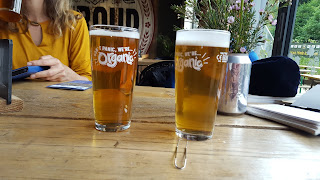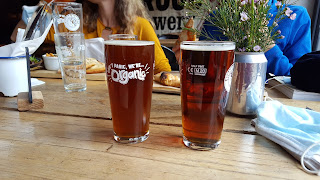The Stroud Brewery is a company with an ethos. It was founded in 2006 by Greg Pilley, whose background was in ecology and environmentalism rather than brewing. And everything that the brewery has done since has been dedicated to sustainability and environmental awareness. It is one of only five fully organic breweries in the country, and it is making great efforts to limit its water usage and carbon footprint – both pressing issues in the industry. Most significantly, the brewery has a strong local ethos: ‘Organic Beer from Round Here’ is one of their slogans. That is a policy that has paid off. When the brewery needed a new home in 2019, they began a crowdfunding campaign to raise an £300k, and locals bought up the bonds in a matter of days. We were staying at an Airbnb in the town, and our landlord was one of the investors. The return on his investment takes the form of a regular delivery of Stroud beers – sounds like a good way to get into the world of high finance. Since then, a similar crowdfunder has raised £87k to see the brewery through the COVID crisis.
The taproom is part of the new brewery site. It is a classic post-industrial, up-and-coming location. The address, Kingfisher Business Park, makes clear that this is an industrial estate. But the site backs on to the Thames and Severn Canal, and access to the taproom is via the towpath. Unfortunately, that is a bit of a work in progress too: the canal is restored up to this point, but only just, and immediately to the east it disappears into dense reedbeds. A restoration project for the canal is also seeking the financial support of the locals, but so far has been less successful than the brewery.
A few weeks before my visit, the company announced a new project, a collaboration with Hugh Fearnley-Whittingstall for a line of beers made with hemp and nettles. I was a little sceptical about this, as I remember Whittingstall’s previous nettle beer, a collaboration with Hall & Woodhouse. Like this one, it was also called Stinger, and wasn’t very exciting. Hemp sounds like a more interesting project though: sativa strains have an important part to play in the future of craft beer, laws permitting of course. And, in fact, this whole ‘River Cottage Organic’ project has a more significant goal. The beers use new and experimental strains of hops (locally sourced, of course) that are more resistant to disease. This has to the way forward for organic beer production, given the susceptibility of hop plants of diseases and aphids.
None of Hugh’s new beers were on tap in the taproom when I visited, and so the range on offer was more traditional. The sheer number of beers was impressive though, about five or six each on keg and cask. The company seems to be treading a fine line between traditional West-Country styles and more fashionable craft beers. Our Airbnb landlord had only one complaint, that they had abandoned bottles in favour of cans. The company argues that cans are more sustainable, but the change suggests a culture shift in a decidedly hipster direction.
SO WHAT WAS THE BEER LIKE?
Here is quick survey of the beers I tried. Apologies if things get a bit blurry further down the list, though I was drinking halves:
OPA (left), Budding (right)
OPA 4%
A good, traditional ale with plenty of chewy mouthfeel from the yeast. Plenty of hops, but this one is more about the malt and yeast.
BUDDING 4.5%
This one is named after the inventor of the lawnmower, who was a local in these parts – a lawnmower IPA then. It is an American-style pale ale, with Amarillo hops and a hazy complexion. This one is the company’s flagship beer, and it’s a winner.
C’HILL 3.8%
A light ale, light in both colour and alcohol. This one is available in the taproom from both cask and keg. A versatile beer then, though a little lacking in character (always a tough ask at this strength). The cask version was the more satisfying.
Merlin (left), Tom Long (right)
MERLIN 4.2%
A malty brown beer, served from keg. Prominent caramel malt profile, but well balanced against bold hop flavours.
TOM LONG 3.8%
Back to the casks for another malty, dark ale. The pump clip promised smooth and crisp, but the yeast character was more prominent to me.
IPA (left), Big Cat (right)
BIG CAT 4.5%
A properly dark stout, served cold from keg. This one was as silky and smooth as the clip promised. Dry though, and surprisingly light.
IPA 5.6%
A classic American IPA. Nelson Sauvin hops, but also something American (Citra?) to balance that Nelson character. An ideal combination of alcohol and hop bitterness.
So there you have it. A good range of session beers, designed to appeal to both traditional West-Country tastes and to more cosmopolitan palates. Most of the beer styles represented here have been interpreted in a traditional way, although the River Cottage project shows that they are not afraid of innovation. One last word about the food – there is a well-staffed kitchen on site, with a spectacular pizza oven. The pizza accompanied the beers very well, but if your priorities are rather for a beer to accompany the food, you’re well catered for here either way.





No comments:
Post a Comment